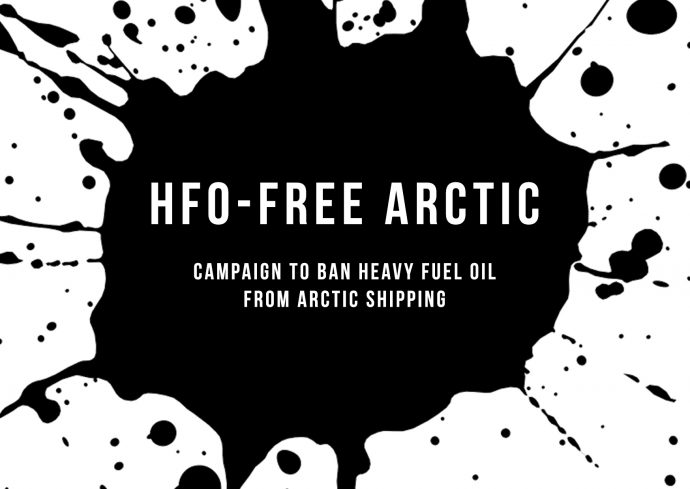Clean Arctic Alliance Response to Cruise Operators’ support of Arctic Heavy Fuel Oil BanThursday, 17 November, 2016: Responding to reports that the Association of Arctic Expedition Cruise Operators (AECO) had reconfirmed its support of a ban on heavy fuel oil (HFO) from Arctic shipping during its annual general meeting [1], Clean Arctic Alliance advisor Dr Sian Prior said: “The Clean Arctic Alliance welcomes AECO’s reconfirmation of its support for an international ban on heavy fuel oil in Arctic waters. AECO’s decision demonstrates the growing conviction within the shipping industry that the Arctic is simply too vulnerable and too fragile to allow the use of this dirtiest of fuels, and that HFO can no longer be considered an option for powering Arctic shipping in the future”. “By acknowledging the threats posed by spills and black carbon emissions from heavy fuel oil, the Arctic cruise industry has recognised that while it expands, it must phase out of this dirty fuel [2] in order to protect the environment and human health, and safeguard coastal communities and food security”, continued Prior. “AECO, and other shipping industry leaders must now take us out of the HFO era by urging member countries to bring forward concrete proposals for a ban by the next meeting of the International Maritime Organization’s Marine Environment Protection Committee (MEPC71), in May 2017. The Clean Arctic Alliance looks forward to working with industry to achieve a HFO-free Arctic”. At last month’s Marine Environment Protection Committee (MEPC70) meeting in London [3], the Clean Arctic Alliance welcomed the progress made by member countries towards a phase-out of the use of HFO in the Arctic [4]. Several Arctic countries as well as IMO Secretary-General Kitack Lim stated their concerns regarding HFO and on the need for further consideration of the risks involved. In order to implement a ban on HFO, the IMO will need to add new work on the regulation of HFO to its programme, and set a deadline for completion of this work, in order to phase out Arctic HFO by 2020. Heavy fuel oil (HFO) is a toxic, tar-like sludge that breaks down extremely slowly in cold Arctic waters and is close to impossible to clean up in the event of a spill. While HFO powers 44% of the ships currently operating in the Arctic, it accounts for more than 75% of the fuel onboard those ships, according to ICCT figures [5]. In September 2016, the United States and Canada formally notified the International Maritime Organization that a “heavy fuel oil spill in the Arctic could cause long-term damage to the environment” [6]. This follows March 2016 commitments made by U.S. President Obama and Canadian Prime Minister Trudeau to “determine with Arctic partners how best to address the risks posed by heavy fuel oil use and black carbon emissions from Arctic shipping” [7]. Also in September, the Danish political party Venstre, the Danish Shipowner’s Association [8], and Arctic cruise sector leader Hurtigruten [9] called for regulating or banning the use of HFO in the Arctic. In October, the CEO Finnish of icebreaker operator Arctia expressed support for a ban on HFO [10]. Heavy fuel oil is already banned throughout Antarctica, and in the national park waters around the Norwegian Arctic archipelago of Svalbard, leaving only a strictly regulated corridor for ships to access the islands. ENDS Notes: [1] 17 November 2016: Maritime Executive: Arctic Expedition Cruise Operators Support HFO Ban http://www.maritime-executive.com/article/arctic-expedition-cruise-operators-support-hfo-ban https://twitter.com/ArcticCruiseOp/status/798853496606892032 [2] In addition to the risks from spills, the burning of heavy fuel oil by ships emits significant quantities of black carbon, potent in accelerating the already rapid pace of Arctic climate change. In the Arctic atmosphere, black carbon absorbs heat from the sun and reflected heat from the snow and ice doubling the warming impact when it settles on the snow and ice surfaces. When black carbon falls on the light-coloured surfaces, it reduces the amount of sunlight reflected back into space, accelerating snow and ice melt. This increases the surface area of exposed, dark ocean water, and promotes a self-reinforcing cycle of land and sea ice melting and climate warming. [3] The 70th Session of the International Maritime Organization’s Marine Environment Protection Committee (MEPC70) met from October 24-28th in London. http://www.imo.org/en/MediaCentre/IMOMediaAccreditation/Pages/MEPC-70.aspx [4] Clean Arctic Alliance press release, 28 October 2016: IMO Moves Towards Arctic Phase Out of World’s Dirtiest Fuel https://www.hfofreearctic.org/2016/10/28/436/ [5] In 2015 there were 925 vessels operating in the Arctic using HFO. This is 44.3% of the total number of vessels operating in Arctic waters, representing 76% of the mass of bunker fuel onboard ships in the IMO Arctic fleet. Source: Heavy fuel oil use in Arctic shipping in 2015, International Council on Clean Transportation http://www.theicct.org/heavy-fuel-oil-use-arctic-shipping-2015 [6] US & Canada Joint Statement on Heavy Fuel Oil http://awsassets.panda.org/downloads/us_can_hfo.pdf [7] US & Canada Joint Statement on Climate, Energy and Arctic Leadership [8] Danish shippers want IMO Heavy Fuel Ban in Arctic https://www.adn.com/arctic/2016/09/20/danish-shippers-want-imo-heavy-fuel-ban-in-arctic/ [9] Hurtigruten CEO calls for size limit on Arctic cruise vessels http://thebarentsobserver.com/2016/08/hurtigruten-ceo-encourages-limit-size-arctic-cruise-vessels [10] “Arctia supports the proposed ban on the use of heavy fuel oil in the Arctic” – Tero Vauraste, President and CEO of Arctia Ltd. http://arctia.fi/en/2016/10/31/next-generation-icebreaker-polaris-ready-for-action/ About the Clean Arctic Alliance The following not-for-profit organisations form the Clean Arctic Alliance, which is committed to achieving the phase out of HFO as marine fuel in the Arctic: Bellona, Clean Air Task Force, Danish Ecological Council, Environmental Investigation Agency, European Climate Foundation, Friends of the Earth US, Icelandic Nature Conservation Association, Nature And Biodiversity Conservation Union, Ocean Conservancy, Pacific Environment, Seas At Risk, Transport & Environment and WWF. More more information visit https://www.hfofreearctic.org/ Twitter: https://twitter.com/cleanarctic Facebook: https://www.facebook.com/CleanArcticAlliance Contacts For more information, including interview requests, please contact Dave Walsh, Communications Advisor, HFO-Free Arctic Campaign, [email protected], +34 692 826 764 Sian Prior, Advisor, HFO-Free Arctic Campaign, [email protected], +44 7785 747945
|

